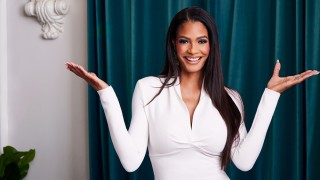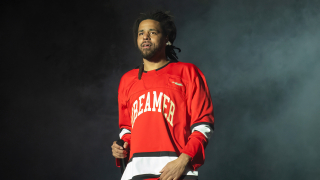According to the Center for Disease Control, 300,000 African-Americans die from preventable diet-related illnesses every year. High-blood pressure, heart disease, type 2 diabetes, high cholesterol and obesity—all linked to diet—are disproportionally plaguing African-Americans and claiming lives.
Will Loiseau has firsthand experience with the fatal consequences of an unhealthy diet. “After noticing some my closest friends and family members were dying at an early age, I started to research alternative diets,” explains Loiseau. The Certified Holistic Sports Nutrition Consultant made the decision to adopt a vegan diet to improve his overall health in 2010. Loiseau’s diet is centered around plants and he abstains from all animal products: no meat, no eggs, no dairy.
Loiseau is part of a growing number of Black vegans in recent years who are eschewing the standard American diet and dispelling not only the prevailing myth that veganism is an affluent White practice, but also debunking stereotypes of African-American cuisine. While Black vegans have long existed (despite the image the media has long peddled), today high-profile celebrities are shining a bright spotlight on this healthy lifestyle and inspiring people of color to be more conscious about their food choices.
Take, for instance, Beyoncé and Jay Z, who in 2013 sampled a vegan diet for 22 days. The Grammy-winning singer recently partnered with her personal trainer Marco Borges to launch 22 Days Nutrition, a vegan home delivery meal service. Following the taping of this year’s BET Honors in D.C., Kanye West and wife Kim Kardashian were spotted enjoying a late-night vegan dinner at Black-owned Woodland Vegan Bistro. The couple feasted on the bistro’s award-winning vegan mac ’n’ cheese, vegan fried chicken, black beans and kale salad.
“Kanye isn’t a vegan, but he enjoys our food. Vegan isn’t bland or boring like many Black folks may think,” says Vernon Woodland, who owns the restaurant with his wife, Mickiyah Woodland. Kanye is such a fan that he hired Woodland Vegan Bistro to cater both his Watch the Throne and Yeezus concerts in D.C. Woodland Vegan Bistro also has a location in College Park, Maryland, and a franchise on the horizon.
“The whole point of what we do is to awaken the community to all the wonderful benefits to moving about life in a more conscious way,” says Woodland, who was raised a vegan. She inspired Vernon to follow suit 13 years ago. “I hope more Black people will consider changing their eating habits and put more thought into what they eat.”
EBONY.com has rounded up three recognized food activists—author and chef Bryant Terry; public health nutritionist, author and speaker Tracye McQuirter; and author, consultant and social scientist Dr. A. Breeze Harper—to share their personal journey into veganism and delve into the ways in which race and politics play an integral role in the dialogue on healthy nutrition in the African-American community.
EBONY: What drew you to veganism?
Tracye McQuirter: In 1986, when I was a sophomore at Amherst, our Black Student Union brought Dick Gregory to talk about the state of Black America. He talked about how unhealthy Americans, especially Black folks, eat. I was totally uninterested in healthy eating. He traced the path of a hamburger from a cow on a factory farm to the slaughterhouse process to a fast-food restaurant to a clogged artery to heart attack, and he traced it very graphically. I had never heard anyone make the connection before between how a hamburger is created and what it does to the body.
I immediately gave up burgers and hot dogs for a week. That summer, I went home back to D.C. and read every single book I could about vegetarianism. By the end of summer, I decided that eating plant-based foods were healthiest. The next year, I spent my junior year in Kenya and I saw how animals were killed for the first time. I understood it culturally, but for me it was a horrifying experience and it kinda solidified that I was not going to eat animals when I got back to the states. I was open to questioning the way society dictated I should eat. I’ve been a vegan for almost 30 years, all of my adult life.
Bryant Terry: As a young person, I was an omnivore. I grew up in Memphis, and my family owned farms in Mississippi. My paternal grandfather had urban garden. All the food we ate was local, fresh and seasonal, and it was always prepared from scratch.
When I got to high school, I moved to a more plant-centered diet when I heard the song “Beef” by Boogie Down Productions, which talked about factory farming. That was the thing that catalyzed me to change my own habits, attitudes and politics around food. I knew nothing about factory farming. I was appalled by the fact that animals are treated so horribly and this is what people eat.
It wasn’t a linear journey. I moved into a vegetarian diet, from there a vegan diet, and then I went back to eating eggs and cheese when I was studying in France, and as graduate student I was eating fish.
Dr. A Breeze Harper: What truly moved me into practicing veganism was reading about Dick Gregory in Doris Witt’s Black Hunger and seeing the connections he made to institutionalized racism, classism, sexism, Black liberation, Black community “health crisis” and dietary beliefs and practices. I had also been reading Queen Afua, a raw foodist who advocates womb health and harmony through veganism.
I had been diagnosed with a uterine fibroid and was seeking non-Western medicine to address it. It was with the help of these two crucial thinkers that I finally saw the interconnectedness to my own “out of harmony reproductive health” as a symptom of structural racism, sexism, non-human animal exploitation.
Immediately I made the transition into Ahimsa (a Sanskrit word for non-killing and non-harming) based veganism. I began realizing that the standard American diet seemed to parallel a colonial and imperialistic mentality. I was consuming colonialistic ideologies, and it was killing my health, physically and spiritually.
EBONY: In the past, veganism had long been seen as a White diet. But that mainstream perception has been changing. When you transitioned into veganism, did you know many other Black vegans?
Bryant Terry: When I think about my own influences to move to a more healthy journey in my relationship with food, so much of it was influence by people of African descent—whether it was KRS-One, Rastafarians or Seventh-day Adventists that I meet, and they educated me. We need to abandon this western American processed industrial food diet.
I look at many Central African diets from which African-Americans came during the transatlantic slave trade, and so many of the diet were vegetable-centric. Not to say they were completely vegan, but I’m talking about vegetable-centric diet. These are the foundational food of people of African descent. We don’t need to look anywhere else to have a healthy relationship with food.
Dr. A Breeze Harper: No, I did not. I was living in the Boston area at the time and had not befriended any Black vegans, but I knew quite a few White ones. This makes sense, since I didn’t live in predominantly Black areas and attended a predominantly White institution, Harvard. Veganism, at least in the United States of America, had the connotation of being a lifestyle of White socio-economic class privileged people.
In my book, Sistah Vegan: Black Females Speak on Food, Identity, Health, and Society, many of the volume’s contributors let their readers know that veganism is for everyone and is not solely the domain of White people. The mainstream message assumes that everyone has a White middle-to-upper-class relationship with food, health, diet and material access. The mainstream has presented a postracial approach to veganism as well, and of course this doesn’t work for most non-White people in which systemic racism is the reality for us.
Tracye McQuirter: When I attended Howard University, I discovered a large vegetarian and vegan community up the street from the campus. There I found the first vegan carry out and health food store in D.C. in the ’80s. This is in a low-income Black neighborhood. I was fortunate that I had this community and support. My sister and I started the first blog for Black vegans in the late ’90s. Now there are so many. There is no reason to still believe this myth in the age of the Internet.
I knew this wasn’t foreign for our culture, even if the majority of us back then weren’t doing it. There have always been two streams going on in Black culinary history. There has been majority stream of people who eat animal-based foods and then a smaller stream who eat plant-based foods.
EBONY: Although we’ve been led to believe that soul food is the only cuisine synonymous with African-American culture.
Bryant Terry: I have a problem when people say soul food is synonymous with African-American cuisine. When most people imagine soul food, what most people are imagining are the antebellum survival food many enslaved Africans had to survive on. These are the remnants of the plantation owners’ table and the worst part of the animal. I think that argument is historically inaccurate, because it simply paints slavery as this monolithic institution.
In the Deep South, in the most oppressive states like a Mississippi, Alabama and Tennessee, most of the needs of slaves were provided by the plantation owners. There were parts of the coastal Carolinas, Louisiana and different parts of the Caribbean where enslaved Africans had Sundays off, and they had a plot of land where they could grow food for their families. We come from a legacy of African-American vegans and vegetarians.
Dr. A Breeze Harper: Like Dick Gregory once said, the quickest way to wipe out a group of people is to put them on a soul food diet. One of the tragedies is that the very folks in the Black community who are most sophisticated in terms of the political realities in this country are nonetheless advocates of “soul food.” They will lay down a heavy rap on genocide in America with regard to Black folks, then walk into a soul food restaurant and help the genocide along.
Tracye McQuirter: I know the origins of soul food and its Black southern cuisine. I don’t have a problem with the name of soul food. It’s not everyday food when we have, it’s for special occasions. The idea that we eat it all the time is not true and has never been true.
EBONY: Is veganism the healthiest diet for us?
Tracye McQuirter: Sometimes we get stumped on this vegan label, but we are basically talking about fiber. We need fiber to help clean out our system, it’s required. There is no fiber in meat and dairy. It’s only in plant, fruit, veggies and whole grains, nuts and beans. The food industry is a billion-dollar industry, and most of that goes into advertising meat and dairy-based food. Plant-based food is healthiest for everyone to eat. The issue with us, and Black women in particular, we have the worst health outcome in the nation. This is the health crisis of our time, and for me as an activist, this is my work. We are dying in our 30s 40s and 50s, and it is unacceptable.
Dr. A Breeze Harper: I think one must be careful with assuming that veganism is a miracle diet. You can transition to a vegan diet and feel like crap because you are eating only iceberg lettuce and French fries. Or you can transition to one in which you are eating all the nutrients and calories you need because you did the research and know what your unique bodily system needs.
My transition into decolonial and Afrocentric veganism benefited my activism, my intellectual, spiritual and physical health by allowing me to understand how my own body—suffering from nutritional related diseases such as fibroid tumors—is a microcosm of the systemic violence and oppression that working class people, women and non-White people collectively experience.
Bryant Terry: I’m not gonna say a vegan diet is a perfect diet for anyone. We all have different bodily constitution, ages, health statuses and culture food ways. All these factors need to drive how we eat. We need to be in tune with what our bodies need, and that may constantly be different if we want to talk about adopting a vegan diet for health reasons.
What I see people do is grabbing whatever they imagine is the healthiest diet and then kinda following the script accordingly. I feel like that is an unhealthy approach, and think we need a more nuanced complex approach to diet. Really checking in and being in tune with what our body needs. We need to be eating mindfully, even if we are eating what we think are healthy foods.
When I think about the exponential rise of diet-related illness in our community, I’m very clear that a plant-centered diet can be instrumental in addressing this public health crisis. Food corporations are destroying our food system and the foundation of habitable earth. If we don’t do something, we are going to be in trouble. We are already in trouble. I personally dealt with so many family members dying and getting sick far too soon.
EBONY: What tips can you offer those who want to transition into veganism?
Dr. A Breeze Harper: Do the nutritional research. Everyone has a different physiology and lifestyle and needs. Make sure you research what you specifically need to make sure you get the nutrients you need. There are books about becoming vegan for children, adults, pregnant women, bodybuilders, etc.
And of course, any radical diet changes mean you should consult with a practitioner to make sure you are transitioning the right way. For example, if you were eating red meat to get your iron levels up due to anemia, you will need to do your own research as well as consult with your physician to make sure the vegan sources of iron you are getting are being assimilated by your body.
Tracye McQuirter: As a nutritionist, I always tell people to focus on adding first rather than taking away. The first things to focus on are greens. You want to make sure twice a day at least your plate has greens on it. I don’t mean lettuce; I mean dark leafy greens like spinach, collard greens, broccoli, mustard greens, swiss chard.
Next thing is, add whole grains. If you like rice, make it short grain brown rice, wild rice, black rice or quinoa. Protein is the piece that stumps most. If you don’t want to eat tofu, you don’t have to. There are hundreds of beans we already eat, such as black-eyed peas, red beans, black beans, lentils and split peas. Tempeh is a soy product that is whole lot healthier than tofu. You can chop it up, batter it and bake it in oven. You get that chewy chicken texture. Seitan is made of wheat gluten and that is pure protein, and it resembles the taste and texture of pepper steak.
Bryant Terry: Obviously mainstream culture needs to be educated about our cuisine and the complex, diverse, nutrient-rich origins of it. But we need to be educated about it too. We don’t know since we’ve bought into the myths and stereotypes about our own food. When think about our foundational food, we are talking about nutrient leafy greens like collards, turnips, kale, black-eyed peas, sugar snap peas, pumpkin and sweet potato. These are all healthy foods.
Part of the conversation has to be: how do we shift the process of preparing our food? Neo-liberalism is very individualistic; everything has to be done by ourselves. I feel if our community is to address this public health crisis, we need to do this in a community. I have long called for faith-based institutions to help transform our community’s habits and politics around food.
Alexandra Phanor-Faury is a Haitian-American writer living in Brooklyn, New York with a slight (OK, major) addiction to fashion and pop culture. When she’s not up in the middle of the night filling her online shopping carts and catching up on style blogs, she’s writing about fashion and entertainment for a number of websites and magazines. Check out her work and blog at AlexandraPhanor.com.













